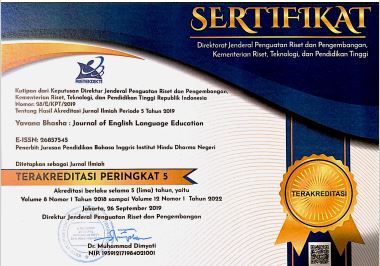THE EFFECTS OF TEACHER’S MOTIVATIONAL STRATEGIES ON EFL LEARNER’S SPEAKING ABILITY IN JUNIOR HIGH SCHOOL
DOI:
https://doi.org/10.25078/yb.v6i2.2812Keywords:
Teacher’s motivational strategies, EFL learner, Speaking abilityAbstract
Learners utilize their speaking ability to communicate, elicit an idea or point of view, convey their ideas and desires, and socialize oneself in order to interact with others. The ability to talk is used to evaluate English comprehension. On the other hand, many EFL learners' ability to use English for oral communication is still low, due to fear and shy. Therefore, EFL learners need motivation to strengthen their confidence. There is one method to achieve it that is teacher’s motivational strategies. Thus, this study aims to determine the effect of teacher’s motivational strategies on EFL learner’s speaking ability. In achieving this goal, the researcher used mixed method research. For the quantitative phase, experimental study was utilized to assess the effect between variables X, the teacher's motivational strategies as an independent variable, and Y, the learner's speaking ability as a dependent variable. Meanwhile, the field notes observation is used in qualitative phase. The post-test of both the experimental and control groups is .029 which is smaller than .05. It is acceptable to assume that there is a significant difference between the experimental and control groups. The calculation shows that the teacher's motivational strategies increase the learner's speaking ability. From the field notes observation, it wshowed that they can participate actively in classroom when teachers are applying motivational strategies or treatment. It can conclude that teachers' motivational strategies increase learner’s speaking ability in experimental group.








